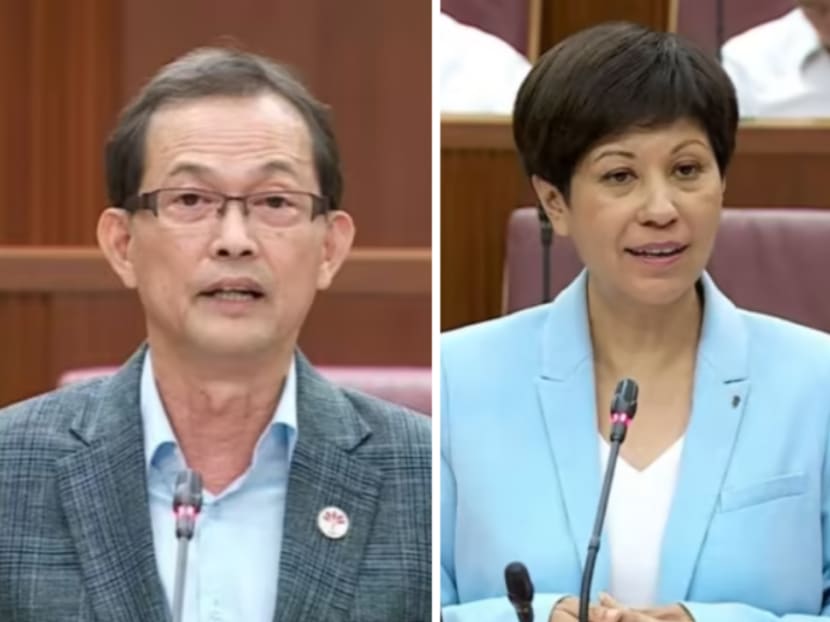Indranee rejects Leong Mun Wai’s calls to give opposition MPs more resources in Parliament, says current rules ‘more than enough’
SINGAPORE — Non-Constituency Member of Parliament (NCMP) Leong Mun Wai made numerous suggestions to give opposition MPs more resources and support, which he said would help them be more effective and hold the Government accountable, but they were rejected by Leader of the House Indranee Rajah.

Ms Indranee Rajah and Mr Leong Mun Wai speaking in Parliament on May 8, 2023.
- NCMP Leong Mun Wai made numerous suggestions to give opposition MPs more resources and support
- This would make them more effective and better hold the Government accountable, he said in an adjournment motion in Parliament
- Among others, he called for allowances to hire legislative assistants and secretarial assistants be increased and extended to NCMPs and Nominated MPs
- Leader of the House Indranee Rajah rejected his suggestions, saying that current rules already allow MPs to hold the Government to account and debate matters
- She added that the answer lies not in changing the rules, but rather for MPs to develop the skills of listening and using the existing rules more effectively
SINGAPORE — Non-Constituency Member of Parliament (NCMP) Leong Mun Wai made numerous suggestions to give opposition MPs more resources and support, which he said would help them be more effective and hold the Government accountable, but they were rejected by Leader of the House Indranee Rajah.
Instead, Ms Indranee said that current parliamentary rules "afford more than enough opportunity for MPs", from the Opposition or otherwise, to hold the Government to account, raise queries and debate matters.
"The real issue is how to do this effectively," she added in a 10-minute speech on Monday (May 8) in response to Mr Leong’s adjournment motion in Parliament.
"The answer lies not in changing the rules, but rather for MPs to develop the skills of listening, using the existing rules more effectively, to make a contribution to the debate and show that they are deserving of the trust that voters have placed in them."
In Mr Leong’s 20-minute speech, titled Making Parliament A Fairer Arena for All, he said that Deputy Prime Minister Lawrence Wong had recently spoken about how, as Singapore develops into a mature democracy, it needs both a serious Government and a serious Opposition.
"The question is whether the current parliamentary structures and processes support the work of a serious Opposition."
Mr Leong, who is secretary-general of the Progress Singapore Party (PSP), added that based on his personal experiences since entering Parliament in August 2020, some parliamentary processes may not be the most conducive to facilitate MPs, including those from the ruling People's Action Party (PAP), to do their jobs.
He suggested giving more resources to MPs across both sides of the aisle, providing them ministers' speeches in advance and according more flexibility in timings when it comes to seeking clarifications during debates, among others.
He also proposed that opposition MPs chair two key parliamentary committees so that these are “seen as independent and impartial”.
PROVIDE MORE RESOURCES FOR PARLIAMENTARIANS
Mr Leong said that many MPs from both sides of the House do not have a public policy or legal background — so they may require assistance as they are required to scrutinise the Government's work.
Noting that MPs are given a monthly allowance of S$1,300 to hire a legislative assistant and S$500 for a secretarial assistant, he said that this is “completely insufficient to hire even one full-time assistant”.
He also noted that NCMPs had their support allowance removed in 1997 because their duties were deemed lighter, but NCMPs today have full voting rights equal to elected MPs and they are also part of parliamentary committees.
Beyond asking for the allowance to hire legislative assistants and secretarial assistants to be increased and extended to NCMPs and Nominated MPs, Mr Leong suggested setting up a parliamentary research department — with a S$1 million starting annual budget — that provides research support for MPs to scrutinise Bills and policies.
“The Opposition lacks access to the resources of our excellent civil service. Handicapped by these lack of resources, alternative policies created by the Opposition will not have the same breadth and depth of the Government’s,” he said.
However, Ms Indranee said "it is indisputable" that the workload of NCMPs and Nominated MPs are lighter than that of elected MPs, since they do not have the responsibility of looking after a constituency or the needs of its residents.
She added that in terms of the allowances given to elected MPs, there is no differentiation between opposition MPs and those from PAP.
On Mr Leong's justification for a research department to be set up, she said: “Many PAP MPs do not come from such (legal or public policy) backgrounds either, they are not asking for this. They have been able to work within the allowances currently allocated to them.”
PAP MPs pool together their legislative assistant allowances to hire an assistant to support two or more MPs, and also draw upon their MP allowance to top up the sum, she added.
She also said that Mr Leong's position has not stopped PSP from “asserting its ability to advance policy positions”, referring to the party’s 2020 General Election manifesto, which cited various economic, social and political policies as an example.
"There is a marked contrast between the statements in PSP’s manifesto and Mr Leong’s statements in Parliament today," she added.
Mr Leong also called on the Government to provide all data asked by MPs in their requested format — to which Ms Indranee said that the Government already provides more data than most countries.
She also reminded Mr Leong and MPs that the data collation process can be time-consuming and costly.
“We will lean forward to provide what is reasonable and practicable, but we cannot fulfil every whim,” she said.
MORE OPPORTUNITIES FOR OPPOSITION TO RAISE MATTERS
To enhance the quality of parliamentary debate, Mr Leong asked the Government to share speeches with MPs in advance, and for MPs to provide a draft of their speeches to ministers beforehand.
“This would be a win-win situation for all, as it enables MPs and ministers to debate on the substantive issues and further the discussion, instead of having to divine whether the questions were answered by the ministerial statement,” he said.
He also suggested having an "opposition hour", which will provide opposition MPs an hour during the first day of every parliamentary sitting to discuss subjects chosen by them. This is similar to the practice in the United Kingdom and Canada, he added.
On this, Ms Indranee said that the system now allows for MPs to engage and debate ministers, regardless of when the speeches are delivered.
For example, the Budget statement is delivered a week before the debates, allowing MPs to think through their speeches.
While there may be instances where advance notice is not possible, such as market-sensitive announcements related to tax policies, MPs are given enough time to digest what has been said, respond and have an informed, substantive debate.
“Every sitting is an opportunity for MPs, whether PAP or opposition, to raise topics of their choice, and to hold the Government to account, challenge policies and decisions, and propose alternative polices through these mechanisms,” she said.
FLEXIBILITY ON TIME
To have more substantive debates on policies, Mr Leong wanted more flexibility around timekeeping for questions and debates.
However, he prefaced that the Speaker of the House should have the discretion to end the debate if further questions asked are not substantive.
However, Ms Indranee noted that this is "the surest way" to trigger Parkinson’s Law — when work increases to fill up the allocated time — which can be ineffective.
“Parliament time is finite, and questions and debates cannot go on without an end. Setting time limits ensures that questions stay focused, answers stay on point and more can be accomplished,” she replied.
CHAIRMANSHIP OF COMMITTEES
Mr Leong suggested that opposition MPs should chair two parliamentary committees so as to be seen as “independent and impartial”.
They are the Public Accounts Committee, which scrutinises the Government’s financial performance and use of public funds, and the Public Petitions Committee, which provides citizens with a platform to voice their issues to the Government.
He noted that the Public Accounts Committee had been chaired by an opposition MP up to 1968, when there were no opposition MPs in Parliament.
Ms Indranee questioned if having an opposition MP chair the two committees would make them independent and non-partisan.
“The better solution is the one that we already have in place under the rules… The composition of each standing select committee should reflect the balance between the government benches and the opposition benches in Parliament,” she said.
“And if you think about it for a moment, that is fair — because it reflects the proportion of government and opposition MPs.”
She also noted that the chairmanship of the two select committees is drawn from the authority of the people — the chair of the Public Petitions Committee is the Speaker of Parliament, and the chair of the Public Accounts Committee is selected by the Speaker.
“In any case, opposition members serve on the select committees and are entitled to ask questions and argue issues fully. There is no reason to think that they have not done their jobs properly,” she said.








